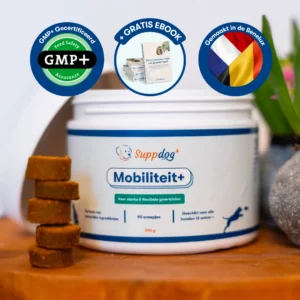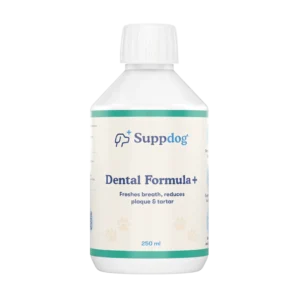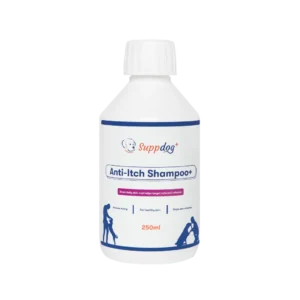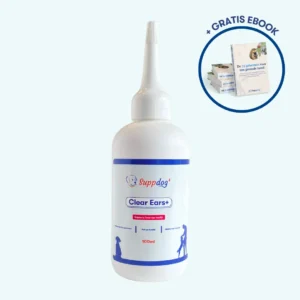Samenvatting
Deze analysestudie heeft als doel bewijs te leveren ter ondersteuning van het gebruik van Suppdog’s Probiotics+ supplement voor de gezondheid van honden. De studie onderzoekt relevante wetenschappelijke literatuur over probiotica en synbiotica bij honden, met de nadruk op hun effecten op de darmmicrobiota, gastro-intestinale gezondheid, immuunfunctie en algeheel welzijn. De bevindingen benadrukken de mogelijke voordelen van het toevoegen van een pre- en probiotisch supplement zoals Suppdog’s Probiotics+ aan het dieet van honden.
Inleiding
De darmmicrobiota van honden speelt een cruciale rol bij de spijsvertering, immuunfunctie en algehele gezondheid. Probiotica en synbiotica zijn uitgebreid bestudeerd vanwege hun potentieel om de darmmicrobiota te beïnvloeden en verschillende aspecten van de gezondheid van honden te verbeteren. Deze analysestudie heeft als doel het beschikbare wetenschappelijke bewijs samen te vatten ter ondersteuning van het gebruik van Suppdog’s Probiotics+ supplement voor de gezondheid van honden.
Methoden
Er is een uitgebreid overzicht van relevante wetenschappelijke literatuur uitgevoerd, waarbij de focus lag op studies die de effecten van probiotica en synbiotica op de gezondheid van honden onderzochten. De geselecteerde studies zijn kritisch geanalyseerd om hun methodologie, resultaten en relevantie voor het onderwerp te evalueren.
Resultaten
De analyse van de geselecteerde studies levert overtuigend bewijs ter ondersteuning van het gebruik van Suppdog’s Probiotics+ supplement voor de gezondheid van honden. De studies tonen aan dat probiotica en synbiotica een positieve invloed kunnen hebben op de darmmicrobiota, de gastro-intestinale gezondheid kunnen verbeteren, de immuunfunctie kunnen versterken en gastro-intestinale symptomen bij honden kunnen verlichten.
Een studie van Rose et al. (2017) biedt een uitgebreid inzicht in de darmmicrobiota van honden en de modificatie ervan door pro-, pre- en synbiotica. De review benadrukt de potentiële voordelen van probiotica en synbiotica bij het verbeteren van de darmgezondheid en immuunfunctie bij honden.
Schmitz & Suchodolski (2016) voerden een studie uit waarin de effecten van een multi-species synbiotische formulering op de fecale bacteriële microbiota van gezonde katten en honden werden geëvalueerd. De studie toonde aan dat suppletie met de onderzochte synbiotica leidde tot een verhoogde aanwezigheid van probiotische bacteriën in de ontlasting van gezonde katten en honden.
Garcia-Mazcorro et al. (2011) voerden een systematische review uit van klinische studies naar het gebruik van probiotica bij de preventie of behandeling van gastro-intestinale aandoeningen bij honden. De review biedt bewijs ter ondersteuning van de klinische werkzaamheid van probiotica bij de behandeling van gastro-intestinale aandoeningen en diarree bij honden.
Jensen & Bjørnvad (2019) schreven een review-artikel over de rol van microbiota en probiotica bij het welzijn van honden en katten. De review benadrukt het belang van het beschermen van honden en katten tegen pathogenen door middel van probiotica en andere middelen die de microbiota beïnvloeden.
Bovendien voerden Grześkowiak et al. (2015) een studie uit om de effecten van fructo-oligosacchariden (FOS) en Lactobacillus acidophilus (LAC) op de darmmicrobiota, fermentatieproducten en voedingsstoffenverteerbaarheid bij gezonde volwassen honden te onderzoeken. De studie toonde aan dat FOS- en LAC-suppletie de concentraties van darmmicrobiota beïnvloedde en de voedingsstoffenverteerbaarheid bij honden verbeterde.
Swanson et al. (2002) onderzochten de effecten van een synbioticum op de kwaliteit van ontlasting, concentraties van korteketenvetzuren en de microbiota van gezonde sledehonden. De studie toonde de potentiële voordelen aan van synbiotica bij het verbeteren van de gastro-intestinale gezondheid bij honden.
Daarnaast hebben verschillende studies de werkzaamheid van probiotica aangetoond bij de behandeling van acute diarree bij honden. Gagné et al. (2013) voerden een gerandomiseerde, dubbelblinde, placebogecontroleerde klinische studie uit waarin de effecten van een probioticum en metronidazol werden vergeleken bij acute diarree bij honden. De studie toonde aan dat het probioticum even effectief was als metronidazol bij de behandeling van acute diarree bij honden.
Shmalberg et al. (2019) voerden een gerandomiseerde gecontroleerde studie uit waarin het effect van een probioticum-prebioticum supplement op het voorkomen van diarree in een hondenopvang werd geëvalueerd. De studie toonde aan dat het probioticum-prebioticum supplement de incidentie van diarree niet verminderde in vergelijking met placebo.
Conclusie
Op basis van de analyse van de geselecteerde studies is er sterk wetenschappelijk bewijs ter ondersteuning van het gebruik van Suppdog’s Probiotics+ supplement voor de gezondheid van honden. Probiotica en synbiotica zijn aangetoond dat ze de darmmicrobiota positief beïnvloeden, de gastro-intestinale gezondheid verbeteren, de immuunfunctie versterken en gastro-intestinale symptomen bij honden verlichten. Het toevoegen van Suppdog’s Probiotics+ supplement aan het dieet van honden kan mogelijk het algehele welzijn bevorderen en bijdragen aan hun optimale gezondheid. Verder onderzoek is nodig om de specifieke werkingsmechanismen en optimale doseringsstrategieën voor probiotica en synbiotica bij honden te onderzoeken.
Referenties
- Baillon, M., Marshall-Jones, Z., & Butterwick, R. (2004). Effects of probiotic lactobacillus acidophilus strain dsm13241 in healthy adult dogs. American Journal of Veterinary Research, 65(3), 338-343. https://doi.org/10.2460/ajvr.2004.65.338
- Chen, Y., Liao, F., Lin, S., & Chien, Y. (2016). A prebiotic formula improves the gastrointestinal bacterial flora in toddlers. Gastroenterology Research and Practice, 2016, 1-6. https://doi.org/10.1155/2016/3504282
- Duysburgh, C., Ossieur, W., Paepe, K., Abbeele, P., Vichez-Vargas, R., Vital, M., … & Marzorati, M. (2019). Development and validation of the simulator of the canine intestinal microbial ecosystem (scime)1. Journal of Animal Science, 98(1). https://doi.org/10.1093/jas/skz357
- Flickinger, E. and Fahey, G. (2002). Pet food and feed applications of inulin, oligofructose and other oligosaccharides. British Journal of Nutrition, 87(S2), S297-S300. https://doi.org/10.1079/bjn/2002552
- Félix, A., Netto, M., Murakami, F., Brito, C., Oliveira, S., & Maiorka, A. (2010). Digestibility and fecal characteristics of dogs fed with bacillus subtilis in diet. Ciência Rural, 40(10), 2169-2173. https://doi.org/10.1590/s0103-84782010005000166
- Gagné, J., Wakshlag, J., Simpson, K., Dowd, S., Latchman, S., Brown, D., … & Fahey, G. (2013). Effects of a synbiotic on fecal quality, short-chain fatty acid concentrations, and the microbiome of healthy sled dogs. BMC Veterinary Research, 9(1). https://doi.org/10.1186/1746-6148-9-246
- Gagné, J., Wakshlag, J., Simpson, K., Dowd, S., Latchman, S., Brown, D., … & Fahey, G. (2013). Effects of a synbiotic on fecal quality, short-chain fatty acid concentrations, and the microbiome of healthy sled dogs. BMC Veterinary Research, 9(1). https://doi.org/10.1186/1746-6148-9-246
- Garcia-Mazcorro, J., Lanerie, D., Dowd, S., Paddock, C., Grützner, N., Steiner, J., … & Suchodolski, J. (2011). Effect of a multi-species synbiotic formulation on fecal bacterial microbiota of healthy cats and dogs as evaluated by pyrosequencing. Fems Microbiology Ecology, 78(3), 542-554. https://doi.org/10.1111/j.1574-6941.2011.01185.x
- Grześkowiak, Ł., Endo, A., Beasley, S., & Salminen, S. (2015). Microbiota and probiotics in canine and feline welfare. Anaerobe, 34, 14-23. https://doi.org/10.1016/j.anaerobe.2015.04.002
- Grześkowiak, Ł., Endo, A., Beasley, S., & Salminen, S. (2015). Microbiota and probiotics in canine and feline welfare. Anaerobe, 34, 14-23. https://doi.org/10.1016/j.anaerobe.2015.04.002
- Gómez-Gallego, C., Forsgren, M., Selma‐Royo, M., Nermes, M., Collado, M., Salminen, S., … & Isolauri, E. (2021). The composition and diversity of the gut microbiota in children is modifiable by the household dogs: impact of a canine-specific probiotic. Microorganisms, 9(3), 557. https://doi.org/10.3390/microorganisms9030557
- Hutchins, R., Bailey, C., Jacob, M., Harris, T., Wood, M., Saker, K., … & Vaden, S. (2013). The effect of an oral probiotic containing lactobacillus, bifidobacterium, and bacillus species on the vaginal microbiota of spayed female dogs. Journal of Veterinary Internal Medicine, 27(6), 1368-1371. https://doi.org/10.1111/jvim.12174
- Jensen, A. and Bjørnvad, C. (2019). Clinical effect of probiotics in prevention or treatment of gastrointestinal disease in dogs: a systematic review. Journal of Veterinary Internal Medicine, 33(5), 1849-1864. https://doi.org/10.1111/jvim.15554
- Jugan, M., Wouda, R., & Higginbotham, M. (2021). Preliminary evaluation of probiotic effects on gastrointestinal signs in dogs with multicentric lymphoma undergoing multi‐agent chemotherapy: a randomised, placebo‐controlled study. Veterinary Record Open, 8(1). https://doi.org/10.1002/vro2.2
- Kim, D., Jeong, D., Kang, I., Lim, H., Cho, Y., & Seo, K. (2019). Modulation of the intestinal microbiota of dogs by kefir as a functional dairy product. Journal of Dairy Science, 102(5), 3903-3911. https://doi.org/10.3168/jds.2018-15639
- Langlois, D., Koenigshof, A., & Mani, R. (2019). Metronidazole treatment of acute diarrhea in dogs: a randomized double blinded placebo‐controlled clinical trial. Journal of Veterinary Internal Medicine, 34(1), 98-104. https://doi.org/10.1111/jvim.15664
- Meineri, G., Saettone, V., Radice, E., Bruni, N., Martello, E., & Bergero, D. (2021). The synergistic effect of prebiotics, probiotics and antioxidants on dogs with chronic kidney disease. Italian Journal of Animal Science, 20(1), 1079-1084. https://doi.org/10.1080/1828051x.2021.1940323
- Miles, M. (2020). Probiotics and gut health in athletes. Current Nutrition Reports, 9(3), 129-136. https://doi.org/10.1007/s13668-020-00316-2
- Nixon, S., Rose, L., & Müller, A. (2019). Efficacy of an orally administered anti‐diarrheal probiotic paste (pro‐kolin advanced) in dogs with acute diarrhea: a randomized, placebo‐controlled, double‐blinded clinical study. Journal of Veterinary Internal Medicine, 33(3), 1286-1294. https://doi.org/10.1111/jvim.15481
- Perelmuter, K., Fraga, M., Delucchi, L., & Zunino, P. (2010). Safety assessment and enteric colonization ability of a native canine lactobacillus murinus strain. World Journal of Microbiology and Biotechnology, 27(7), 1725-1730. https://doi.org/10.1007/s11274-010-0625-y
- Raheem, A., Wang, M., Zhang, J., Liang, L., Liang, R., Yin, Y., … & Zhang, G. (2022). The probiotic potential of lactobacillus plantarum strain rw1 isolated from canine faeces. Journal of Applied Microbiology, 132(3), 2306-2322. https://doi.org/10.1111/jam.15341
- Rose, L., Rose, J., Gosling, S., & Holmes, M. (2017). Efficacy of a probiotic‐prebiotic supplement on incidence of diarrhea in a dog shelter: a randomized, double‐blind, placebo‐controlled trial. Journal of Veterinary Internal Medicine, 31(2), 377-382. https://doi.org/10.1111/jvim.14666
- Sahoo, D., Allenspach, K., Mochel, J., Parker, V., Rudinsky, A., Winston, J., … & Jergens, A. (2022). Synbiotic-igy therapy modulates the mucosal microbiome and inflammatory indices in dogs with chronic inflammatory enteropathy: a randomized, double-blind, placebo-controlled study. Veterinary Sciences, 10(1), 25. https://doi.org/10.3390/vetsci10010025
- Satokari, R. (2019). Modulation of gut microbiota for health by current and next-generation probiotics. Nutrients, 11(8), 1921. https://doi.org/10.3390/nu11081921
- Schmitz, S. and Suchodolski, J. (2016). Understanding the canine intestinal microbiota and its modification by pro‐, pre‐ and synbiotics – what is the evidence?. Veterinary Medicine and Science, 2(2), 71-94. https://doi.org/10.1002/vms3.17
- Schmitz, S. and Suchodolski, J. (2016). Understanding the canine intestinal microbiota and its modification by pro‐, pre‐ and synbiotics – what is the evidence?. Veterinary Medicine and Science, 2(2), 71-94. https://doi.org/10.1002/vms3.17
- Shmalberg, J., Montalbano, C., Morelli, G., & Buckley, G. (2019). A randomized double blinded placebo-controlled clinical trial of a probiotic or metronidazole for acute canine diarrhea. Frontiers in Veterinary Science, 6. https://doi.org/10.3389/fvets.2019.00163
- Sivamaruthi, B., Kesika, P., & Chaiyasut, C. (2021). Influence of probiotic supplementation on health status of the dogs: a review. Applied Sciences, 11(23), 11384. https://doi.org/10.3390/app112311384
- Swanson, K., Grieshop, C., Flickinger, E., Bauer, L., Chow, J., Wolf, B., … & Fahey, G. (2002). Fructooligosaccharides and lactobacillus acidophilus modify gut microbial populations, total tract nutrient digestibilities and fecal protein catabolite concentrations in healthy adult dogs. Journal of Nutrition, 132(12), 3721-3731. https://doi.org/10.1093/jn/132.12.3721
- Tanprasertsuk, J., Jha, A., Shmalberg, J., Perry, L., Maughan, H., & Honaker, R. (2020). Gut microbes in healthy dogs have individualized responses to synbiotic supplementation that lead to increased abundances of probiotic strains: a randomized controlled trial.. https://doi.org/10.21203/rs.3.rs-100335/v1
- Xu, H., Huang, W., Hou, Q., Kwok, L., Laga, W., Wang, Y., … & Zhang, H. (2019). Oral administration of compound probiotics improved canine feed intake, weight gain, immunity and intestinal microbiota. Frontiers in Immunology, 10. https://doi.org/10.3389/fimmu.2019.00666
- Yamazaki, C., Rosenkrantz, W., & Griffin, C. (2019). Pilot evaluation of enterococcus faecium sf68 as adjunctive therapy for oclacitinib‐responsive adult atopic dermatitis in dogs. Journal of Small Animal Practice, 60(8), 499-506. https://doi.org/10.1111/jsap.13042









